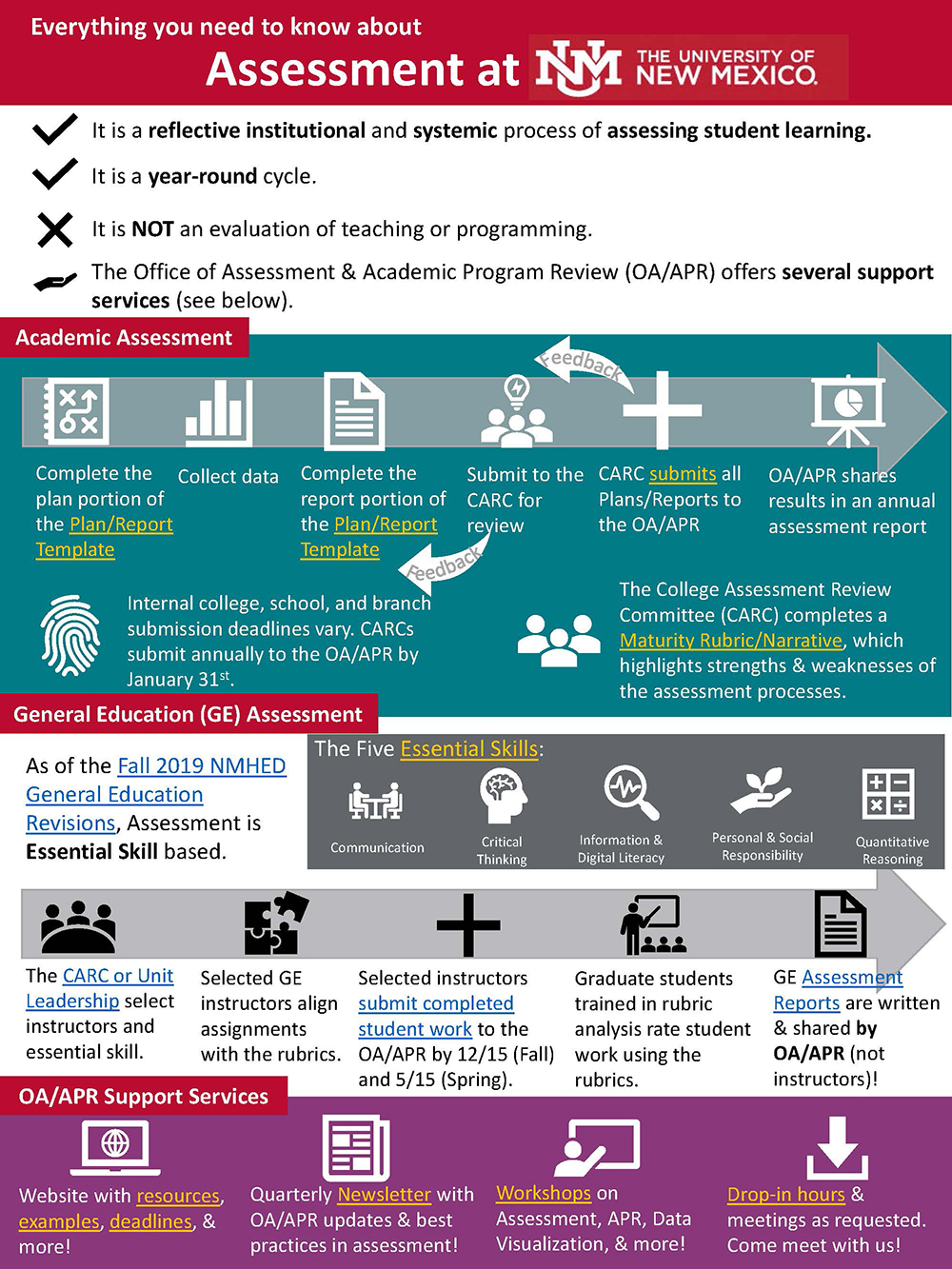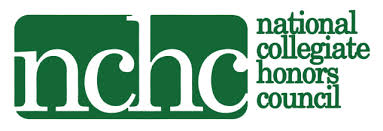Assessment in the Honors College
The Honors College assesses two categories of student learning: BA curriculum and core curriculum. The Assessment Director works closely with the University’s Office of Assessment and works to follow best practices in all areas, including design of assessment tools; collection of data; and analysis of data for adjusting and improving teaching.
BA Curriculum
Student Learning Outcomes for the BA:
Currently, college-level assessment in the Honors College occurs in all 1000- and 400-level courses. Honors faculty have developed six Program Student Learning Outcomes (PSLOs) which form the six pillars of the college. They will be assessed on a three-year schedule:
- Academic Year 2024-2025: Communication; Community Engaged Learning
- Academic Year 2025-2026: Interdisciplinarity; Creative Thinking
- Academic Year 2026-2027: Research; Critical Thinking
The six PSLO, along with course-level outcomes associated with each pillar, are as follows:
PSLO #1: Interdisciplinarity:
Honors College students will integrate knowledge, perspectives and/or skills (perhaps conflicting) from two or more disciplines in a unified argument, strategy, or solution.
Course-level student learning outcomes for #1. Upon completion of the course, students will be able to:
- Demonstrate familiarity with the knowledge and modes of thinking of two or more disciplines or approaches.
- Integrate diverse--and perhaps conflicting--knowledge, perspectives, and/or skills into a unified argument and/or strategy.
- Apply two or more approaches to a single problem or project.
PSLO #2: Critical Thinking:
Honors College students will illustrate sound, evidence-based evaluations of issues or problems, including sufficient support and appropriate reasoning.
Course-level student learning outcomes for #2. Upon completion of the course, students will be able to:
- Locate information from various sources and perspectives.
- Evaluate perspectives from multiple sides of a topic or argument.
- Organize evidence to support arguments.
- Identify implications and consequences of arguments and conclusions.
- Define common biases and heuristics that prevent critical thinking
PSLO #3: Communication Skills:
Honors College students will produce written and/or oral presentations that demonstrate a thorough understanding of audience, context, and purpose as well as use of language.
Course-level student learning outcomes for pillar #3. Upon completion of the course, students will be able to:
- Identify rhetorical situation (audience, purpose, stance, genre, media/design)
- Present clearly organized, precise, and persuasive arguments or documents.
- Communicate effectively in one-on-one and group contexts.
- Express ideas and concepts precisely and persuasively in multiple formats.
- Employ error-free language that skillfully communicates meaning with clarity and fluency.
PSLO #4: Research:
Honors College students will generate original knowledge and/or meaning through the systematic study of a problem, topic, or prompt.
Course-level student learning outcomes for pillar #4. Upon completion of the course, students will be able to:
- Define a researchable question or problem.
- Apply disciplinary or cross-disciplinary knowledge and methods to design and execute a research study that addresses the question or problem.
- Evaluate information, literatures, and evidence critically.
- Communicate findings in written and verbal forms.
- Connect research to broader intellectual and practical contexts to articulate relevance.
PSLO #5: Community Engaged Learning
Honors College students will engage diverse communities and encourage mutually beneficial partnerships.
Course-level student learning outcomes for pillar #5. Upon completion of the course students will be able to do at least one of the following:
- Apply knowledge and skills across or within diverse communities to address complex societal challenges.
- Demonstrate cross-cultural understanding by interacting with communities and spaces outside of one's own.
- Contribute to the broader community through service learning or other mutually beneficial projects.
PSLO #6 Creative Thinking:
Honors College students will craft a material, process, or text through deliberate manipulation of tools and methods.
Course-level student outcomes for pillar #6. Upon completion of the course students will be able to:
- Think and act creatively and collaboratively while transforming materials;
- Analyze and assess a problem or process by framing it historically, politically, conceptually and aesthetically;
- Take risks and solve problems through iteration, revision, and exploration of divergent solutions;
- Articulate the formal and conceptual motivations of one’s work in written and verbal forms;
- Critique creative works.
The deadlines for submitting college-level assessment materials to the Honors Assessment Coordinator are as follows:
- Materials from the fall semester: February 1
- Materials from the spring semester: June 1
Further details, including the relevant rubrics and the process for completing and submitting materials, will be provided to faculty by Honors Assessment Coordinator, Dr. Renée Faubion (sanren@unm.edu).
Gen Ed Curriculum
Student Learning Outcomes for Gen Ed Curriculum:
Gen Ed assessment occurs in all 1000- and 2000-level Honors courses. In Gen Ed Assessment, faculty are required by the state to evaluate Essential Skills against mandated rubrics on a particular schedule. The Essential Skills for each area and their rubrics are available at this website:
Essential Skills for each area will be assessed on a three-year schedule:
- Academic Year 2024-2025
- (HNRS 2112) Writing and Speaking: Information and Digital Literacy
- (HNRS 2113) Fine Arts: Communication
- (HNRS 2221) Mathematics and Statistics: Communication
- (HNRS 2331) Physical and Natural Sciences: Personal and Social Responsibility
- (HNRS 2364) Social and Behavioral Sciences: Personal and Social Responsibility
- (HNRS 1120 and 2167) Humanities: Personal and Social Responsibility
- Academic Year 2025-2026
- (HNRS 2112) Writing and Speaking: Communication
- (HNRS 2113) Fine Arts: Personal and Social Responsibility
- (HNRS 2221) Mathematics and Statistics: Quantitiative Reasoning
- (HNRS 2331) Physical and Natural Sciences: Quantitative Reasoning
- (HNRS 2364) Social and Behavioral Sciences: Communication
- (HNRS 1120 and 2167) Humanities: Information and Digital Literacy
- Academic year 2026-2027
- All Gen Ed courses will assess Critical Thinking
The deadline for submitting materials to the Office of Assessment is Dec. 15 for the fall semester and May 15 for the spring semester. Further details, including the relevant rubrics and the process for completing and submitting materials, will be provided to faculty by Honors Assessment Coordinator, Dr. Renée Faubion ( sanren@unm.edu).
Writing SLOs FAQ
Writing student-learning outcomes (SLOs) for Honors courses:
Every syllabus must include student learning outcomes. The Honors College faculty have already written PSLOs for the college; these materials are located in the BA Curriculum tab, and they are broken down into course-level SLOs. Please represent at least one or two of these PSLOs in your course syllabus and adapt them to the particular topic of the course. You might do this by inserting a phrase in the SLO. For example, if the SLO you want to use under Critical Thinking indicates that students will define common biases and heuristics that prevent critical thinking, you might add “to controversies in human rights” if that later element reflects the focus of the course. You may also want to add additional SLOs of your own design as appropriate to your course.
Please also remember that the state has mandated Essential Skills for 100- and 200-level courses across the university. That information can be found in the Gen Ed Curriculum tab and should be considered in designing courses and syllabi.
Tips for writing new SLOs:
- Student learning outcomes need not summarize everything you want to accomplish in the course. They are meant to provide some measurable guidelines for your students.
- Since they need to be measured/assessed you do not want to have too many. Four to six is usually an adequate number of SLOs.
- Also since they need to be measured they should have an active verb in the sentence. For example, “Upon completion of this course students will be able to define important concepts in archaeology.” Define is measurable. Avoid verbs such as appreciate since that is deemed unmeasurable in the context of assessment.
- It is expected that a range of skills will be represented in a set of SLOs. Refer to Bloom’s taxonomy for a scale and a list of accompanying verbs. That is, in addition to requiring students to memorize something, faculty might also require the higher order skill of analyzing something.
Good SLOs facilitate clarity in course goals, content, and evaluation. They help students understand what is expected of them. They also facilitate fairness in grading, and allow the faculty to determine which activities and materials are effective or not. (adapted from Designing and Assessing Courses and Curricula: A Practical Guide, R. Diamond)




Social Media
For news, information, prizes and more fun stuff follow us on our social media!
Honors College Resources